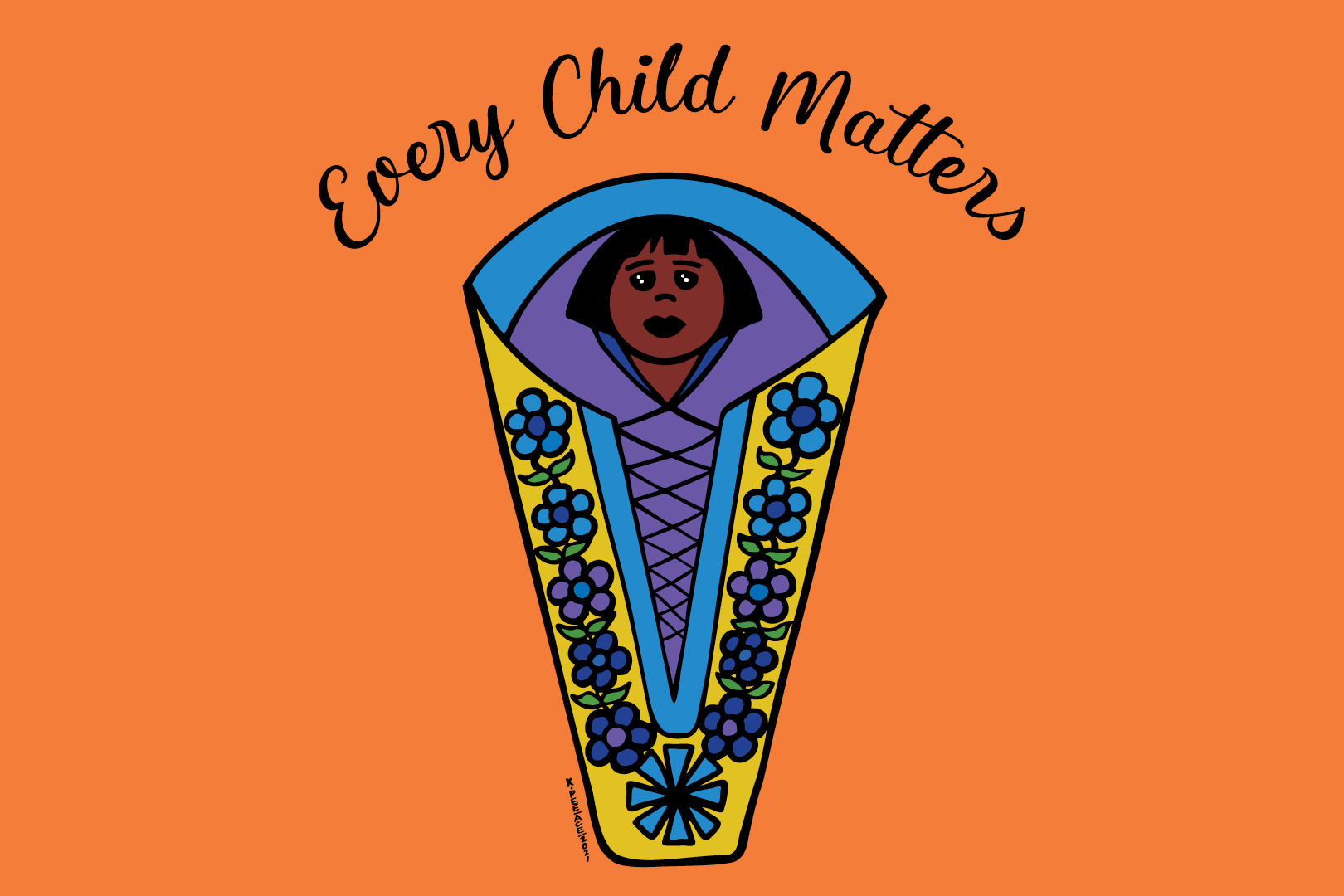
More than a shirt: the artwork featured by USask on Orange Shirt Day 2021
Learn about the partnerships that helped share original artwork by Indigenous artist Kevin Peeace with the USask community.

Before it became recognized as the National Day for Truth and Reconciliation in Canada, September 30 was (and still remains) deeply connected with Orange Shirt Day — a time to acknowledge and remember residential school survivors and their families.
Orange Shirt Day is an annual event inspired by Stswecem'c Xgat'tem First Nation member Phyllis Webstad's personal experience of having her new orange shirt taken away on her first day in the Canadian residential school system.
In 2019, the University of Saskatchewan (USask) Indigenous Space and Visual Symbols in the Health Sciences Committee began working with Shop USask to coordinate the sale of non-college-specific orange shirts to help the campus community recognize Orange Shirt Day. Thanks to widespread interest from individuals and a number of USask colleges and departments placing group orders, proceeds totalling nearly $5,000 were put toward Indigenous causes.
Although the disruption of the COVID-19 pandemic prevented the committee from preparing orange shirts in 2020, the group returned in 2021 to once again work with Shop USask and offer a way for people to demonstrate that “Every Child Matters.”
“Getting an original design by a local Indigenous artist was essential,” said Indigenous Research Chair in Nursing and committee member Dr. Holly Graham (RN, PhD). “I worked with local artist Kevin Peeace in the past and when discussions about this particular shirt began, I really hoped he would partner with the committee on this design, as his work is truly exquisite.”
For Peeace, the artwork on the shirt “speaks to the importance of our children and future generations.” His children both used his grandfather’s moss bag, which has been in the family for over 100 years.
“The traditional moss bag represents protection; with the child being held, swaddled, and immersed within our culture. The moss bag is both a traditional and practical item that has been used, and continues to be used, by my family and many of our relatives,” said Peeace.
In 2021, proceeds from the sales of these shirts were directed toward the Saskatoon Residential School Survivors Circle and a Spring 2022 sequel to the Gathering for miyomahcihowin.
“We cannot have reconciliation without having open conversations about the truth of what happened in residential schools and the resulting losses and grief that are now intergenerational and ongoing for Indigenous people,” said Valerie Arnault-Pelletier, co-chair of the Indigenous Space and Visual Symbols in the Health Sciences Committee. “Orange shirt day is a great reminder in ensuring those truths continue to be recognized, heard and acknowledged every day, and that aspects of reconciliation need to be explored with open hearts and minds. Orange shirts can be worn any day of the week year round.”
“It is important to help spark conversations about the truth behind what happened in the residential school system. It wasn’t as long ago as many people believe,” said Dr. Adam Baxter-Jones, interim associate provost, health, and symbols committee co-chair.
In 1996, the Saskatchewan’s Gordon Residential School was the last federally-funded residential school to close in Canada.
To learn more about Orange Shirt Day and the Canadian residential school system, please visit the links below or feel free to begin your own research on this tragic period of Canadian history:
- OrangeShirtDay.org
- Standing Together in Grief and Committing to the Work Ahead (USask President’s statement on the Cowessess First Nation tragedy)
- USask to observe National Day for Truth and Reconciliation
- History of Residential Schools in Canada (via Canadian Geographic Indigenous Peoples Atlas of Canada)
- ‘Cultural genocide’: the shameful history of Canada’s residential schools – mapped (via The Guardian)
- Residential Schools in Canada: A Timeline (video via Historic Canada)
- Stolen Children | Residential School survivors speak out (video via CBC News: The National)
- Truth and Reconciliation Commission of Canada (Government of Canada)
For emotional crisis referral services and information on other health supports from the Government of Canada, residential school survivors can call 1-866-925-4419.
The University of Saskatchewan community is encouraged to access support services through Student Affairs and Outreach by calling (306) 966-5757 or emailing intake@usask.ca.
The Hope for Wellness Help Line is also available to Indigenous peoples across Canada 24 hours a day, 7 days a week for counselling and crisis intervention. Toll-free at 1-855-242-3310 or available via online chat at hopeforwellness.ca.

